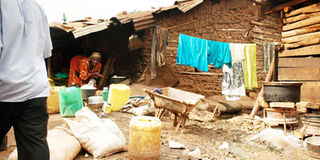World Bank advises government to craft pro-poor policies

A woman prepares food in Kimombasa, a slum in Bwaise on the outskirts of Kampala. Governments have been asked to go beyond poverty reduction programmes by attending to people at risk of being left out. Photo by Edgar Batte
What you need to know:
Most non-poor Ugandans are classified as vulnerable, meaning they can easily slide back into poverty.
The World Bank has advised Uganda to develop policies that aim at social inclusion as the country positions itself to become a middle income country in the next couple of decades following its development strategies in the national vision.
Uganda aims to become a middle income country by 2040 and the country’s grand plans are outlined in its “Vision 2040”. However, the World Bank says expectations from a middle income country are higher than those from low income ones.
The World Bank says middle income countries are expected to address issues of social inclusion in ways that go beyond poverty reduction and that they are expected to attend to the needs of thosewho are most vulnerable to being left out using the available natural resources.
Speaking during the launch of the report on Social Inclusion last week, the World Bank country manager Mr Ahmadou Moustapha Ndiaye, argued that social inclusion is high up on the global policy agenda, pointing out that it is a central tenet of the World Bank Group’s new strategy with its twin goals of ending extreme poverty and boosting shared prosperity.
Social inclusion
The report defines social inclusion in two ways. One, it involves improving the terms for individuals and groups to take part in society.
Secondly, it is the process of improving the ability, opportunity and dignity of people disadvantaged on the basis of their identity.
Mr Ndiaye said: “Social inclusion is becoming more and more urgent for Uganda. Profound transitions like the changing population structure, urbanisation, climate change, information revolution and natural resource driven growth are creating new opportunities but also risks for inclusion.
Uganda’s youth bulge, for instance, will become a key policy issue just as the country moves into middle income status.”
He added: “This report reinforces the message that inclusion can be planned and achieved. It sets out to help policy makers address these issues.”
The rising attention to issues of social inclusion is based on the realisation that while great strides have been made in reducing extreme poverty in country after country, entire groups remain excluded from development gains.
Mr Ndiaye said: “In Uganda, poverty headcount declined from over 56 per cent in 1992/93 to 22 per cent on 2012/13.
This is an impressive achievement. But income inequality rose as well. In the same period, the Gini co-efficient increased from 37 to 43 per cent.”
Benefits
Mr Ndiaye explained that there are significant benefits of addressing social inclusion matters socially, politically and economically.
Since early 2002, the government has been running a re-construction programme in Northern region called Northern Uganda Social Action Fund Project (NUSAF) using funding from the World Bank.
The NUSAF programme empowers communities in the 18 districts of northern Uganda that have been ravaged by conflict over the last 20 years to improve their lives, which in part is about social inclusion.
The programme has two phases; the first has ended and the second which is in place is costing about Shs248 billion ($100 million).
Globally, this report, the first of its kind for the World Bank Group, is one of the most comprehensive reviews of these issues in the world today.
Uganda’s progress
The report reveals that in the last two decades, Uganda has made huge progress in education. It has also had dramatic decline in poverty and has witnessed steady growth. Yet, significant challenges for social inclusion remain, and new ones are emerging.
The new World Bank global report titled “Inclusion Matters: The Foundation for Shared Prosperity,” puts boundaries around the abstract idea of social inclusion.
It points out that social inclusion is not just about poverty reduction or about reducing income inequality; it is the process of improving the ability, opportunity and dignity of people, disadvantaged on the basis of their identity, to take part in society.
Mr Ndiaye said: “Uganda’s development is testimony to the government’s efforts in embracing social inclusion through dedicated programmes and by creating an enabling environment that gives its citizens better access to markets, services and spaces.”
Recent World Bank reports on youth employment and land issues in Sub-Saharan Africa, for instance, emphasise that social inclusion is central to addressing these problems.
Focus on shared prosperity
Since the period of economic reconstruction in 1987, the government has been putting a lot of emphasis on high economic growth and poverty reduction. Mr Doniger said they are well aware that a focus on poverty alone will not take the country to the next stage of development.
“We also have to focus on shared prosperity; and these are the two goals of the World Bank,” Mr Dongier said, adding: “We have realised that confronting the need for social inclusion will prove vital if we are to meet our goal of building shared prosperity for all people. Uganda is on the right track to addressing social inclusion, but this is just the beginning.”
Mr Doniger advises that both the World Bank and Uganda cannot address social inclusion unless they learn from each other.




